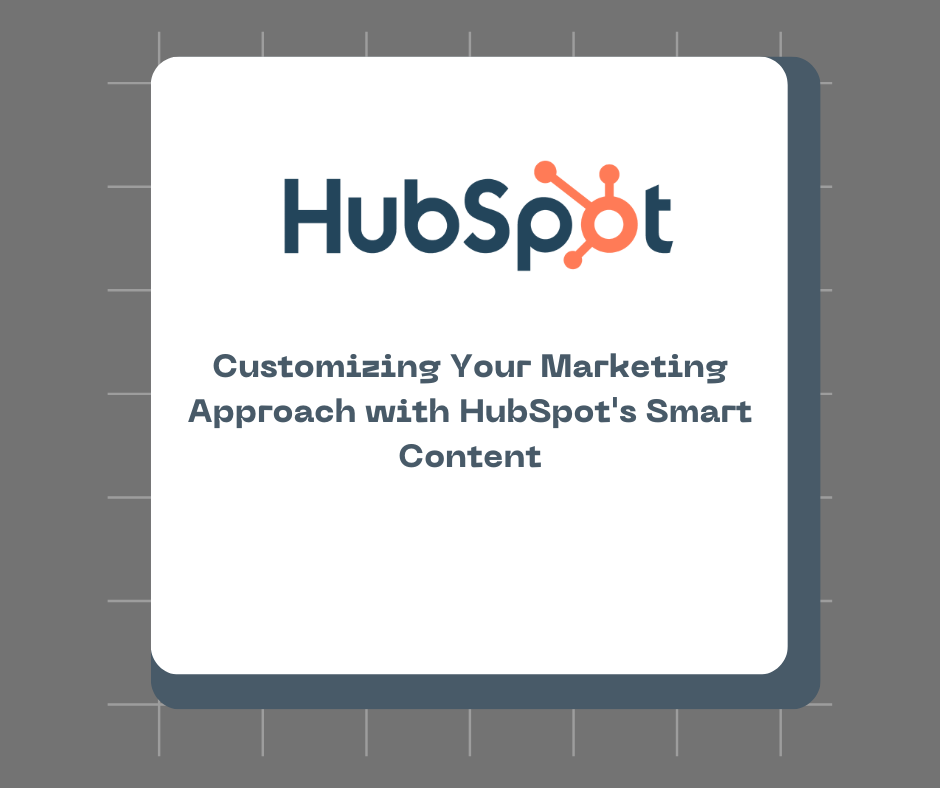In the realm of digital marketing, personalization has emerged as a game-changer, enabling businesses to deliver targeted, relevant content to their audience and drive engagement, conversions, and loyalty. HubSpot, a leading CRM and marketing automation platform, offers a powerful feature known as Smart Content, which empowers marketers to customize their marketing approach based on visitor attributes, behaviors, and preferences. In this comprehensive guide, we'll explore the benefits of Smart Content, delve into its key features and capabilities, and provide actionable insights for leveraging HubSpot's Smart Content to tailor your marketing strategy and drive results.
Understanding Smart Content
Smart Content is a dynamic feature within HubSpot that enables marketers to personalize website content, email campaigns, CTAs (calls-to-action), and more based on visitor characteristics and interactions. By leveraging data from HubSpot's CRM and marketing automation tools, Smart Content allows marketers to deliver tailored experiences to individual visitors, enhancing engagement, conversion rates, and overall user satisfaction.
Key Features and Capabilities of Smart Content
1. Dynamic Website Content
With Smart Content, marketers can customize website content such as headlines, images, and messaging based on visitor attributes such as location, device type, lifecycle stage, and more. This enables businesses to deliver personalized experiences that resonate with each visitor and drive action.
2. Email Personalization
Smart Content extends to email marketing campaigns, allowing marketers to tailor email content based on recipient characteristics and behaviors. Marketers can create dynamic email templates that display different content blocks or messaging based on recipient data, increasing the relevance and effectiveness of their email communications.
3. Adaptive CTAs
Smart Content enables marketers to create adaptive CTAs that change dynamically based on visitor attributes and interactions. By displaying different CTAs to different segments of visitors, marketers can optimize conversions and drive more targeted actions, such as sign-ups, downloads, or purchases.
4. Form Field Customization
Smart Content allows marketers to customize form fields on landing pages or website forms based on known visitor data. By prefilling form fields with known information or hiding unnecessary fields, marketers can streamline the form submission process and improve the user experience, leading to higher conversion rates.
Benefits of Using Smart Content
1. Enhanced Personalization
Smart Content enables marketers to deliver highly personalized experiences to their audience, increasing relevance and engagement. By tailoring content based on visitor attributes and behaviors, marketers can create meaningful connections with their audience and drive action.
2. Improved Conversion Rates
Personalized content has been shown to significantly impact conversion rates, with studies indicating that personalized CTAs can outperform generic CTAs by up to 202%. By leveraging Smart Content to deliver targeted messaging and offers, marketers can drive higher conversion rates and ROI (return on investment).
3. Increased Engagement and Retention
Personalization has the power to captivate and retain audiences, with studies showing that 63% of consumers are more likely to make a purchase from a website that offers personalized recommendations. By delivering relevant content and offers to their audience, marketers can increase engagement, loyalty, and lifetime value.
4. Streamlined Marketing Efforts
Smart Content streamlines marketing efforts by automating the process of content customization and personalization. Instead of manually creating multiple versions of content for different segments, marketers can leverage Smart Content to dynamically adapt content based on visitor data, saving time and resources.
Best Practices for Leveraging Smart Content
To maximize the effectiveness of Smart Content in your marketing strategy, consider the following best practices:
1. Define Your Target Audience
Segment your audience based on demographic, firmographic, and behavioral data to create targeted Smart Content campaigns. Understand the needs, preferences, and pain points of each segment to deliver relevant and personalized content.
2. Use Data to Inform Content Decisions
Leverage data from HubSpot's CRM and marketing automation tools to inform content decisions and personalize messaging. Monitor visitor behavior, engagement metrics, and conversion rates to identify trends and opportunities for optimization.
3. Test and Iterate
A/B test different versions of Smart Content to determine which variations resonate most with your audience. Experiment with different messaging, offers, and CTAs to optimize performance and drive better results over time.
4. Monitor Performance and Adjust
Regularly monitor the performance of your Smart Content campaigns using HubSpot's analytics and reporting tools. Track key metrics such as conversion rates, engagement, and ROI to identify areas for improvement and make data-driven adjustments.
Conclusion
Smart Content is a powerful tool for marketers looking to personalize their marketing approach and drive results. By leveraging HubSpot's Smart Content features, marketers can deliver tailored experiences to their audience, enhance engagement and conversion rates, and streamline marketing efforts. Whether it's dynamic website content, personalized email campaigns, or adaptive CTAs, Smart Content enables marketers to create meaningful connections with their audience and achieve their business objectives. Embrace the power of Smart Content in your marketing strategy with HubSpot and unlock new opportunities for success and growth in your business.
Schedule your training session here and comment “Need Training” on the request form.

Comments